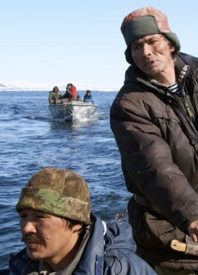
The Book of the Sea does its best to juggle three different story lines. Two of those story lines concern two groups of Chukchi and possibly Russian hunters. The first hunt fish and whale. And one of their members is still in the pack despite his doctor’s orders not to. The second is a solitary seal hunter who looks more ethnically Russian than the first group. The third story line is a portrayal through animation, of Chukchi stories.
The third story line in this documentary is probably the best one, showing the paradoxes within the Chukchi hunting culture. One of these myths involve a whale that their ancestors marked. This indicates a method of sustainable, compassionate way of consuming food. The animation that director Aleksei Vakhrushev uses or commissions is also textural. It ensures that the audience is aware of the body of water sustaining the Chukchi people for years. Through good and bad.
The film shows the reality of living in harsh conditions, relate-able to anyone living through winter. It also takes an interest in depicting the hunters’ process more than themselves as people. Just as it gets close to the hunters, it backs away and switches to the narrator of the animation scenes. It attempts to contextualize these contemporary hunters with their past. But that seems like a reductive idea to posit for a documentary and its human subjects.
Another misstep here is the score. During the animation scenes, the film uses it as an attempt to add whimsy to stories. But these stories are already inherently whimsical. For the rest of the documentary, it tries to heighten the more mundane moments. Travelling scenes don’t always need intrusive violins. This could have been both honest yet beautiful but the film soft balled its depiction of Indigenous life.
For more information on Book of the Sea go to https://www.imaginenative.com/the-book-of-the-sea.
- Release Date: 10/25/2019

